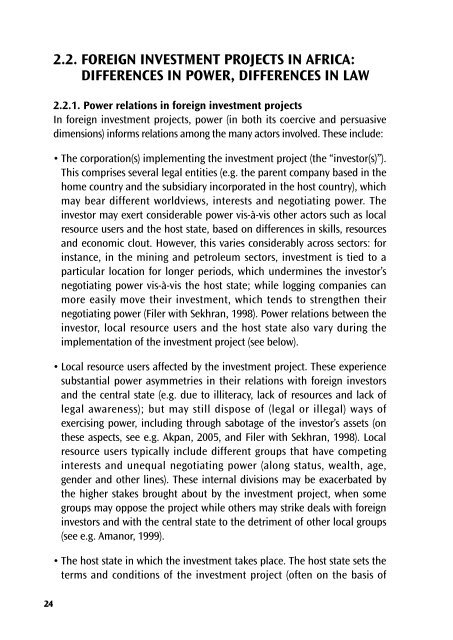Legal empowerment for local resource control
Legal empowerment for local resource control
Legal empowerment for local resource control
You also want an ePaper? Increase the reach of your titles
YUMPU automatically turns print PDFs into web optimized ePapers that Google loves.
24<br />
2.2. FOREIGN INVESTMENT PROJECTS IN AFRICA:<br />
DIFFERENCES IN POWER, DIFFERENCES IN LAW<br />
2.2.1. Power relations in <strong>for</strong>eign investment projects<br />
In <strong>for</strong>eign investment projects, power (in both its coercive and persuasive<br />
dimensions) in<strong>for</strong>ms relations among the many actors involved. These include:<br />
The corporation(s) implementing the investment project (the “investor(s)”).<br />
This comprises several legal entities (e.g. the parent company based in the<br />
home country and the subsidiary incorporated in the host country), which<br />
may bear different worldviews, interests and negotiating power. The<br />
investor may exert considerable power vis-à-vis other actors such as <strong>local</strong><br />
<strong>resource</strong> users and the host state, based on differences in skills, <strong>resource</strong>s<br />
and economic clout. However, this varies considerably across sectors: <strong>for</strong><br />
instance, in the mining and petroleum sectors, investment is tied to a<br />
particular location <strong>for</strong> longer periods, which undermines the investor’s<br />
negotiating power vis-à-vis the host state; while logging companies can<br />
more easily move their investment, which tends to strengthen their<br />
negotiating power (Filer with Sekhran, 1998). Power relations between the<br />
investor, <strong>local</strong> <strong>resource</strong> users and the host state also vary during the<br />
implementation of the investment project (see below).<br />
Local <strong>resource</strong> users affected by the investment project. These experience<br />
substantial power asymmetries in their relations with <strong>for</strong>eign investors<br />
and the central state (e.g. due to illiteracy, lack of <strong>resource</strong>s and lack of<br />
legal awareness); but may still dispose of (legal or illegal) ways of<br />
exercising power, including through sabotage of the investor’s assets (on<br />
these aspects, see e.g. Akpan, 2005, and Filer with Sekhran, 1998). Local<br />
<strong>resource</strong> users typically include different groups that have competing<br />
interests and unequal negotiating power (along status, wealth, age,<br />
gender and other lines). These internal divisions may be exacerbated by<br />
the higher stakes brought about by the investment project, when some<br />
groups may oppose the project while others may strike deals with <strong>for</strong>eign<br />
investors and with the central state to the detriment of other <strong>local</strong> groups<br />
(see e.g. Amanor, 1999).<br />
The host state in which the investment takes place. The host state sets the<br />
terms and conditions of the investment project (often on the basis of

















